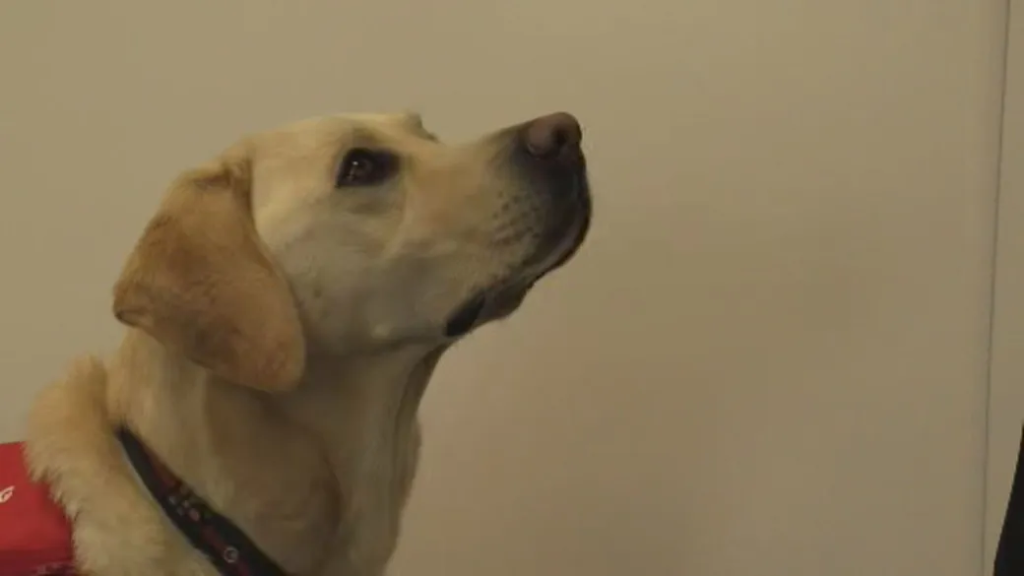Dogs’ brains are sensitive to the familiar high-pitched “cute” voice tone that adult humans, especially women, use to talk to babies, according to a new study.
The research, published recently in the journal Communications Biology, found “exciting similarities” between infant and dog brains during the processing of speech with such a high-pitched tone feature.
Humans tend to speak with a specific speech style characterised by exaggerated prosody, or patterns of stress and intonation in a language, when communicating with individuals having limited language competence.
Such speech has previously been found to be very important for the healthy cognitive, social and language development of children, who are also tuned to such a high-pitched voice.
But researchers, including those from the Eötvös Loránd University in Hungary, hoped to assess whether dog brains are also sensitive to this way of communication.
In the study, conscious family dogs were made to listen to dog, infant and adult-directed speech recorded from 12 women and men in real-life interactions.
As the dogs listened, their brain activities were measured using a functional magnetic resonance imaging (fMRI) scan.
The study found the sound-processing regions of the dogs’ brains responded more to dog- and infant-directed than adult-directed speech.
This marked the first neurological evidence that dog brains are tuned to speech directed specifically at them.
“Studying how dog brains process dog-directed speech is exciting, because it can help us understand how exaggerated prosody contributes to efficient speech processing in a nonhuman species skilled at relying on different speech cues,” explained Anna Gergely, co-first author of the study.
Scientists also found dog- and infant-directed speech sensitivity of dog brains was more pronounced when the speakers were women, and was affected by voice pitch and its variation.
These findings suggest the way we speak to dogs matters, and that their brain is specifically sensitive to the higher-pitched voice tone typical to the female voice.
“Remarkably, the voice tone patterns characterizing women’s dog-directed speech are not typically used in dog-dog communication – our results may thus serve evidence for a neural preference that dogs developed during their domestication,” said Anna Gábor, co-first author of the study.
“Dog brains’ increased sensitivity to dog-directed speech spoken by women specifically may be due to the fact that women more often speak to dogs with exaggerated prosody than men,” Dr Gabor said.

Dogs have nose for COVID-19, studies show. Why aren’t they used for testing?

As the availability of COVID-19 tests dwindle across Canada, another option to detect the virus in the form of a furry friend may be the next best thing.
Multiple studies show that dogs can be more effective, faster and potentially less expensive than the current tests on the market.
The research has grown since 2020, with University of California Santa Barbara professor Tommy Dickey finding the collective research shows trained scent dogs are “as effective and often more effective” than both the rapid antigen tests many people keep in their homes, and even the PCR tests deployed at clinics and hospitals.
But even with studies showing their effectiveness, COVID-19-detecting dogs are deployed only in certain jurisdictions in various countries.
One such place is the Canines for Care program at Vancouver Coastal Health (VCH), which started looking into the possibility of training dogs to detect COVID-19 in early 2021.
Dr. Marthe Charles, division head of medical microbiology and infection prevention and control at VCH, said the idea stemmed from the early reliance on laboratory testing.
“I think there was a will from public health at the time and also from the various levels of government to try to find a way that was fast, accurate and non-invasive to be able to detect and train as many people as possible,” Charles told Global News in an interview.
Three dogs — two Labrador retrievers and an English springer spaniel — were brought in for training. The dogs were exposed to items such as masks that were worn by patients either negative or positive for the virus. This trained the dogs to recognize what is and is not COVID-19.

Charles said the dogs were trained since being puppies to associate the scent of COVID-19 with food and were rewarded each time they correctly detected a positive case of the virus.
“So from early on in their lives, they’ve associated the scent of a case of COVID to a rewarding scent,” she explained.
This reward method is not just used by VCM. It was also used with a group of dogs sourced in early 2021 for a French study, trained at detection using toys — usually tennis balls — as rewards.
Dr. Carla Simon, owner of Hunter’s Heart Scent Detection Canines in Calgary, said this method of training dogs is common. By using rewards, it can help motivate them to find the scent.
“We would pair, let’s say, the sweat samples with COVID, with their reward, and they notice that every time they find their reward, there’s that special smell,” she explained. “We just have to make it rewarding for the dog.”
She added, however, that the dog chooses the reward so trainers can ensure the canines “show up every day and want to do their job.”
Earlier this month, Dickey along with Heather Junqueira of BioScent, Inc. gathered several peer-reviewed studies into a review that was published in the Journal of Osteopathic Medicine. Dickey said the number of peer-reviewed studies over the past few years went from four to 29, incorporating the work of more than 400 scientists from more than 30 countries and 31,000 samples.
The review noted the effectiveness of dogs’ ability to detect COVID-19 comes down to their noses.

“The nose is not like humans,” Simon said. “It’s massively different, orders of magnitude different, and they can detect things without us being able to smell them.”
Humans have about five to six million olfactory receptors in their noses, while dogs have hundreds of millions. One-third of their brain is devoted to the interpretation of smell — something only five per cent of a human’s brain is committed to, according to Dickey’s review.
The study found dogs’ noses may even be able to detect pre-symptomatic COVID-19 cases, or even those who will develop symptoms later.
Dickey told us in an interview that this could help limit or stop the virus from spreading.
“The longer the wait is between your test and your result, that’s a latent period,” he said. “During that time you’re running around spreading COVID and you don’t know it. The dogs with a direct sniff will be done in seconds.”
Many of the studies conducted, including the work at VCH through the Canine for Care program, have shown dogs’ ability to detect the disease correctly with a success rate of more than 90 per cent. Additionally, the studies also showed a high speed at which the dogs could identify cases. In one study in Thailand, researchers reported the dogs had gone through thousands of samples in just a few weeks.
“The dogs take only one to two seconds to detect the virus per sample. Once they detect a patient, they will sit down,” said Chulalongkorn University professor Kaywalee Chatdarong, who led the 2021 project. “This takes only one to two seconds. Within one minute, they can manage to go through 60 samples.”
Even though the research suggested deploying scent-detection dogs could also be less expensive than rapid or PCR tests, Charles cautioned the logistics that go into training the dog is where it becomes “more prohibitive.”

In VCH’s case, training of the dogs included the medical microbiology lab to provide samples for use, working with infection prevention teams and control nurses, and if a dog identifies an area of concern, cleaning services may need to be utilized. And when it comes to rolling out testing using the dogs, enough staffing is needed for mass screening.
Despite this, while Charles says deploying the dogs widely could be difficult due to staffing and training, they are still one of several tools that can be used in COVID-19 detection.
“I think the way to see those dogs from my perspective is really like another tool in the toolbox and trying to prevent further transmission of pathogen of concern,” she said.
Dickey and Junqueira say dogs should have a place in “serious diagnostic methodology” including in helping should the world face a future pandemic.



Leave a Reply